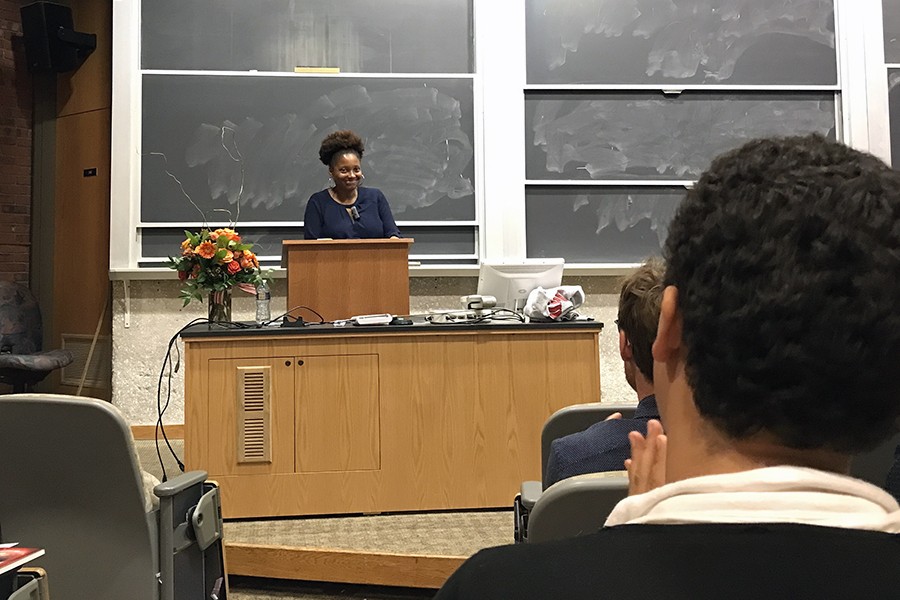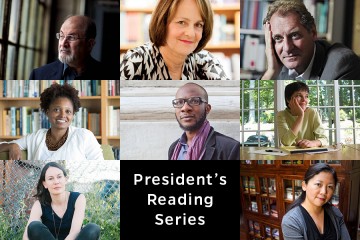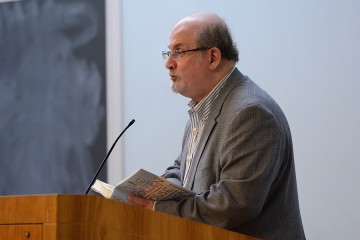Tracy K. Smith, the Pulitzer Prize-winning poet laureate of the United States, visited Johns Hopkins University on Tuesday night for a lecture on the power and mystique of metaphor.
Metaphor, one might recall from grade school, is the comparison of two things without using "like" or "as." All the world's a stage, for example. He's a bad apple. Love is a battlefield.
For Smith, metaphor is a way of paying attention and really seeing something during the close examination of an experience. It's the literary device—the "mechanism"—Smith said she trusts when writing.
"What I'm interested in thinking about is something that feels startling and familiar at the same time," she said.
Smith suggested that metaphor can be a useful tool for scientists, too.
Imagine trying to describe the expansion of the universe without relying on highly specialized information, she said. One might be tempted to use a metaphor—comparing the expanding universe to "a bowl of walnut raisin bread dough, left to rise on the kitchen counter." If a reader can imagine that dough rising, she said, and see it filling with gases and slowly pushing out from its gooey center, then that reader has learned "to see the strange realm of the universe" as something familiar.
"That simple metaphor gives us the tools to feel at home in a puzzling view of an enormous system we will only ever partially grasp," she said. "A good metaphor allows a certain kind of impossibility to become comprehensible: Paradox is brought within our grasp."
She added that this is especially true when exploring abstract issues relating to the human experience: death, fear, love, and the divine. Metaphors, she said, initiate "a transubstantiation of words into a powerful, visceral jolt," and they allow a reader to gain access to an author's subjective, personal experience.
Also see
"[Metaphors] take the charged experience of the speaker and they reproduce it, putting readers in touch with the enormous and untranslatable feelings that usually sit outside of language," she said. "It's a type of miracle that happens every day, changing facets of the world for us. More emphatically, I think that [metaphor] changes us for the world."
Smith was invited to speak at Johns Hopkins as part of the President's Reading Series and the Turnbull Lectures, a series that has been running almost continuously at Johns Hopkins since 1891. Past Turnbull lecturers have included such literary figures as T.S. Eliot, W.H. Auden, Jacques Derrida, Marianne Moore, Robert Frost, and W.S. Merwin.
Smith is the author of four poetry collections and won the 2012 Pulitzer Prize for her collection Life on Mars. She teaches creative writing at Princeton University. Following her lecture, she read four poems from her forthcoming book, Wade in the Water, scheduled for release in April: "The Angels," "Wade in the Water," "The World Is Your Beautiful Younger Sister," and "Ash."
She also read from poems by Jack Gilbert ("Measuring the Tyger," "Michiko Dead"), Lynda Hull ("Love Song During Riot with Many Voices"), and Elizabeth Bishop ("At the Fishhouses").
Posted in Arts+Culture, Voices+Opinion
Tagged literature, poetry












